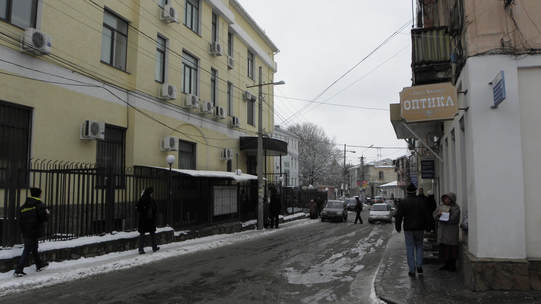 Russian Embassy, Simferopol, Crimea 4 March 2012 (author's own image) Russian Embassy, Simferopol, Crimea 4 March 2012 (author's own image) Six years ago I was in Crimea. This was my first field trip to the Crimean peninsula. It is peculiar to reflect back on this time now that so much has changed. I was in the early stages of data collection and didn't know much about Crimea. It was unseasonably cold in Crimea. Snow was falling, and a far cry from the supposed Mediterranean climate that I had expected. The only shoes I had with me that meant I did not slide into every road I crossed were an old pair of trainers. You can imagine: I stood out. I always stood out, but the trainers only enhanced this with my British-lack of heels and inability to cope well with Simferopol's slush. But the 2012 Russian presidential elections on 4 March stick in my head. I remember making sure to pass by the Russian embassy several times that day to see what the vibe was. I thought the Russian presidential elections might be a bigger deal in Crimea than I witnessed them being. Before lunch on the day of the elections, I saw a few people (around 30) coming to vote. Some were even taking photos of themselves outside of the embassy. There were a few local TV cameras around and a few local police. And there was me, sheepishly try to suss out what was going on without drawing too much attention to myself. One thing that was striking was the age: all (of the few) that I saw coming to vote were elderly. Later that day, I remember watching Putin's victory on TV with my host. Watching Putin cry as he returned to office, the event seemed so remote. It was hard to imagine this victory as something that might matter to Crimea. It is precisely these contrasts -- expectations vs observations -- that have guided my understanding of Crimea as a place that is more complex, notably in terms of Russian identification, then is often given credit. Maybe more were voting in Sevastopol, as Crimea's "Russia's city", but this precisely the surprising thing about Crimea how our knowledge is often produced about peninsula from the perspective of Sevastopol. But, six years later, these contrasts are the the precise ironies. Putin's return to Russia's presidency marked a ramping up of Russia's support for "compatriots" in places like Crimea. Then, four years ago, Putin led Russia's annexation of Crimea. In the space of a few weeks, Crimea's residents became Russian citizens (or were required to register as foreigners). Tomorrow Russian citizens will go to the polls. They will likely seal a further victory for Putin. Elections will be held in Crimea precisely on the day, four years previously, that Russia formally annexed Crimea: 18 March 2014. As I sit in London writing this, with snow on the ground, the UK is in the throes of a tense and uncertain relationship with Russia, following the attempted murder of Sergei and Yulia Skripal in Salisbury. Who knows where Crimea, Putin, or UK-Russian relations will be in six years' time.
0 Comments
Your comment will be posted after it is approved.
Leave a Reply. |
Archives
October 2022
Categories |
 RSS Feed
RSS Feed